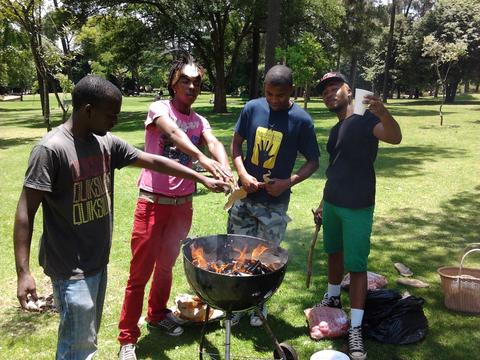
Amidst the scorching mid-week weather of Johannesburg, around 50 volunteers from the IkamvaYouth Gauteng branches, Ebony Park and Ivory Park, gathered for their annual year-end celebratory outing at Zoo Lake. This was the first time that the two Gauteng branches merged for a volunteer appreciation event organized by IkamvaYouth. The beautiful park had scenery which most viewed as an appropriate setting. In attendance were National Co-ordinator Zamo Shongwe, Gauteng Regional Co-ordinator Patrick Mashanda, Branch Co-ordinators Nyasha and Mbali with assistants, Bongani and Modjadji.
The volunteers immediately used the opportunity to get to know each other through conversations, which often turned into heated debates, games and activities. Some of the activities showed obvious competitiveness and team work while others were just plain fun. Proceedings got underway as fire was prepared for a meaty braai. A delightful lunch was served thereafter coupled with snacks and drinks.

The day had its usual share of addresses, though brief, from Patrick and Zamo who both reiterated the important role that the volunteers play at IkamvaYouth and conveyed their gratitude for the self-less contributions made by the tutors throughout the year. They both touched on the key role that the volunteers play in making the IkamvaYouth vision, a national sensation by 2030.
The day concluded with awards from the Ebony Park branch, which were voted for by the learners and volunteers. The first awards were for the most contributing tutors, which went to Hlengiwe Radebe, Ntabelang Matjee, Gregory Behrens and Talent Mzili. The award for best tutor went to Hlengiwe Radebe whereas the award for leadership went to Talent Mzili.
On behalf of the IkamvaYouth Gauteng Branch volunteers, many thanks to everyone who made the day possible, we truly felt the appreciation. Here’s to many more years of the IkamvaYouth movement!
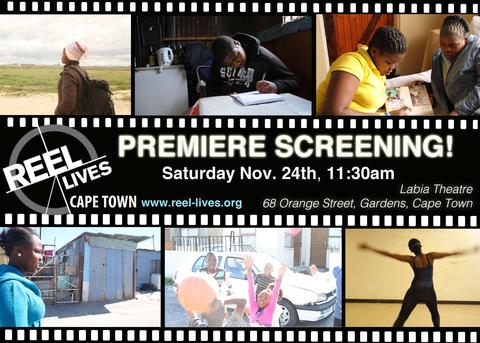
The past three months have seen a few of the Nyanga and Makhaza learners turn into local short film documentary film makers – learning valuable industry skills, while grappling with real issues they face in their lives. Partnering with a US based organisation,
Reel Lives, who use
filmaking media to support education, empowerment and social change.
Each of our learners in the program shot and edited an individual, non-fiction film related to a personal human rights issue in their own lives. Through the process of making these films, they were supported in engaging with their own lives in a unique way, and in experiencing the catharsis of an informal, but powerful, art therapy structure.
Have a look at their teasers, as well as read about the process and what they’ve got up to over the past three months here.
And now please join us in supporting our learners for the premiere of their films!
Saturday November 24th, 11:30am (doors open @ 11am. Please arrive early, limited seating)
Labia Theatre, 68 Orange Street, Gardens, Cape Town
FREE entry, Donations appreciated.
We look forward to seeing you there, please feel free to bring along partners / friends / family
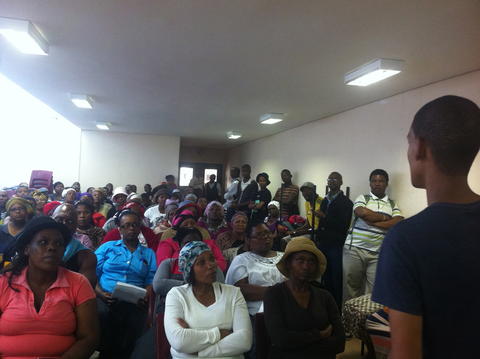

The big number of parents that attended, showed the willingness and dedication these parents have for their children’s education.
At the meeting a number of issues were discussed with some of the more important issues being the role IkamvaYouth plays, attendance, the IY mission and vision, the benefits of being part of IY, report collection and tertiary placements for 2012 grade 12s. The parents also spoke about their experiences of the program, the concerns they have and how all the different projects and tutoring plays a role in shaping the lives of their children. The parents were excited about what their children are doing at Ikamva Youth and also looked forward to reaping the rewards and sharing in the successes of their children.
Also part of the meeting was the tutors who had opportunity to voice their opinions, concerns and successes they had while tutoring this year. One thing that stood out was the willingness of everyone present to make this program a success. One parent noted that this is one of the very few organisations that add value to her child as well as her life. She said that education is key in fighting poverty and finding a way out of township life and thanked IkamvaYouth for accepting her child in the programme. A grade 12 parent noted that money is one of the biggest stumbling blocks that keep their children from going to university and through IkamvaYouth’s involvement and our endeavors in helping students get bursaries, paying the application and registration fees, we are helping to make their dreams a reality.
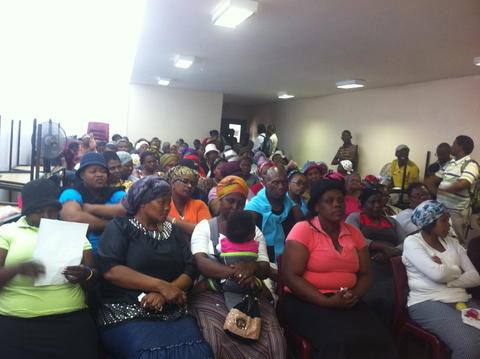
The success of our programme is directly linked to the involvement of parents and through the interaction at the meeting we realised that the future of this beautiful country is looking bright. There is a willingness of people everywhere to make a difference and once a vision is shared it becomes a reality. Success breeds success and this saying was proved at the meeting. If everyone plays their role, no matter how small and insignificant they might think it is, change is possible.
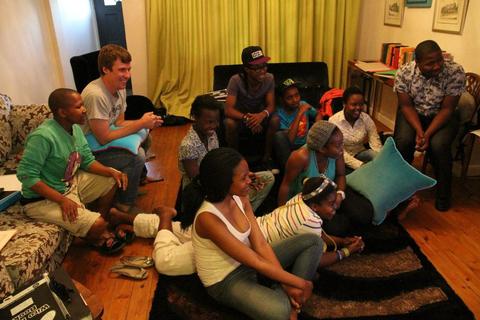

IkamvaYouth is very lucky that for the past two months 8 lucky ikamvanites has had the opportunity to be part of a film-making course with Reel Lives. The film-making course is being facilitated by Leah Sapin, Director of programs, and Lyle Kane, the Executive Director. Both Leah and Lyle are from New York and they have brought along with them very expensive photography equipment to help our learners tell their stories.
Reel Lives uses media to support education, empowerment and social change. Their approach consists of an integrated set of programming that achieves both depth and breadth of service. Each student learns the skills associated with documentary filmmaking, from cinematography to narrative development and non-linear editing with Final Cut Pro. Each young filmmaker is engaging with their own lives through film. Executive director and former teacher, Lyle Kane said, “Working with these young filmmakers in Cape Town has been amazing both personally and professionally. The power of their stories will have an impact on anyone who sees these films, and the process has proven to us that our model of training is transferable. Our work dovetails so wonderfully with the concept and practice of IkamvaYouth’s work.”
“Reel Lives has been very useful to my life. It supported me on the huge challenge that I use to be afraid of. Now I am at the top of my life. I have accepted and know myself better,” said Kuhle Riti, one of the lucky Ikamvanites. The Reel Lives project has started as an idea to show the world what really happens in South African townships from an insider’s perspective. Most documentaries tell stories from the outside, but by equipping the learners with the skills to make their own documentary, they give the world a personal view of what really happens.
Students are not just taught in a classroom setting, but they are taught how to handle the film-making equipment and shoot their documentaries on their own and in a group. This teaches the students how to work on their own, but also how to look after expensive equipment and will stand them in good stead later on in the lives.
Join us on the 24th of November 2012 for the premiere of the documentaries. More details will follow, so watch this space.
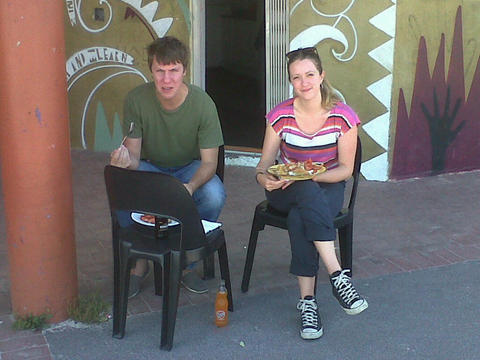

For the past 2 months Michael McLean from Trinity College has been working at Ikamva Youth’s Makhaza branch as an intern. He had a range of responsibilities, but was primarily tasked with creating English lessons and a framework through which future tutors can work. He has identified some of the things the students are having difficulty with and below are some of the things he has done as part of his English lessons.
Exercises
Grammar
One of the primary issues that learners face is a lack of grammatical skills. They especially need help with concepts like parts of speech, contractions, and punctuation. The website English for everyone provides a number of useful exercises. The following is an example of a punctuation worksheet we used.
Full stop Marks the end of a sentence.
Examples:
- I am a boy.
- I am a grade 12 learner at Chris Hani High School.
- My favourite South African singer is Zahara.
- I want to do medicine at the University of Cape Town.
- I do not like dogs.
Note– After a full stop, you have to start the next word with a capital letter.
Example– I have one sister. Her name is Nikiwe.
Comma– Used to join two different statements into one sentence. Also used when listing things.
Examples:
- He is a very smart boy, but he does not like to do his homework.
- I have apples, oranges, bananas, and apples.
- My dad and I like to go fishing, swimming, and hiking on the weekend.
- Jonas likes to watch movies, play games, and sleep.
- Katie talks to her mom, dad, brother, and sister.
Question Mark– Used at the end of a question.
Example:
- What is your name?
- How old are you?
- What is your favourite movie?
- Who is your favourite actor?
- What time are you going to Shoprite?
Apostrophe- Used to indicate that something belongs to someone/something
Example:
- My father’s family is from the Eastern Cape.
- Nelson Mandela’s book is very inspiring.
- The children’s clothes are very dirty.
- This is my teacher’s pen.
- My friend’s dog is very loyal.
Fill in the Blanks with the appropriate punctuation sign.
- What time does the bus arrive _____
- My favorite food is Hungry Lion _____
- The baby cub likes to snuggle up to his mother to keep warm _____
- Do you know how to ride a bicycle _____
- What is your favorite season _____
Add commas, full-stops and question marks where appropriate.
- Did you have chicken rice and soup for lunch
- Where are the spoons forks and knives
- After school I will read do homework and go to bed
- Yellow blue brown green and blue are my favorite colors
- The salad has lettuce tomatoes and dressing
Rewrite the following sentences and use the apostrophe sign.
Example: These books belong to Tumelo. – These are Tumelo’s books.
- The car belongs to my mom.
- I just saw the car that belongs to your father.
- This playground belongs to the children.
- These books belong to my sister.
- The car that belongs to my father is very fast.
Reading
This is another important subject to cover. Fortunately, all you need is a book. Have learners take turns reading, helping them through the tougher sections or concepts. Take time to look up words that they don’t understand, and make sure that everyone understands what is happening in the story.
Speaking
Actually applying written skills to speaking can be a challenge for some learners, so some speaking exercises should be done. Of course they will speak when reading or explaining their answers to grammar worksheets, but a more direct approach can be taken. We did an activity called “topics from a hat.” Learners selected random topics which we had made beforehand (HIV, friendship, taking the train, etc). They then had 5 minutes to prepare a 1 minute presentation. The learner with the best presentation (based on length, clarity, substance, grammar, and confidence) received a small prize- in this case a piece of chocolate. These orals should be utilized in various forms and gradually expanded upon.
Spelling
Spelling was another problem area we identified. Like speaking, improvement can come simply from doing other exercises, but focusing on spelling specifically is a good idea. In our case we held a spelling bee. I created a list of about 50 words of varying difficulty. Learners went around in a circle, each attempting to spell a different word. If they were incorrect in their spelling, they were out, and the next person got a chance to spell the word (after 3 wrong, the next word was chosen). We also told them the correct spelling. Those who were correct advanced to the next round, which was more challenging, until only 3 were remaining. The top 3 received prizes. This activity was fun for the learners and encouraged improvement with those who did not do well.
Critical Thinking/ Writing
This was the last major issue that we found with regards to English. To address it, we have been using various exercises and activities. The following is an example. These usually take more time than simple grammar exercises, so be sure to schedule enough time for them to finish and for you to go over the correct answers. Critical thinking is about learners thinking outside the box, so this is an open-ended area, though worksheets are useful.
Identification of Cradock crash victims starts
A school bus and a Mercedes-Benz Sprinter minibus crashed on the R61 between Cradock and Graaff-Reinet on Saturday.
In the bus were staff and pupils, mainly from Cradock Primary School in the small Eastern Cape town, who were on their way to a sports event. In the minibus were adults and children travelling from Cape Town to Mthatha.
The police department said the most of the identification process would take place on Wednesday when relatives and next-of-kin arrived on a bus arranged for them by a private transport company from Cape Town.
“It is very traumatising. The department of social development will have social workers and counselors on hand to help with this.” Both drivers died in the crash. The school was closed on Monday as it came to terms with the tragedy, said Loyiso Pulumani, spokesman for Eastern Cape education MEC Mandla Makupula.
Deputy principal Alfie Blume was critically injured and was in hospital in Bloemfontein. Teachers Ray-Jean Wright and Jacques de Meillon were flown by helicopter to Greenacres Hospital in Port Elizabeth, for intensive care, reported The Times newspaper.
Pulumani said he would visit the school on Tuesday to express their condolences, and to see what help could be provided.
Pulumani said the crash had compounded an impending teaching crisis at the school as, besides existing vacancies, two teachers were booked off ill for treatment and recovery from cancer. Before the accident, the former model C school had applied for extra teachers. Now it had lost its principal, and was uncertain about when its deputy and the two other teachers would be able to return.
New Vocabulary
Traumatising-
Tragedy-
Injured-
Condolences-
Impending-
Questions (Answer the following questions with FULL SENTENCES.)
- What happened to the drivers of the two cars?
- Who else was involved in the car crash?
- Where were they travelling to?
- Why did the Eastern Cradock Primary School close on the Monday following the accident?
- How/Why did the car crash contribute to the teaching crisis at the Eastern Cradock Primary School?
Assignment
In a short paragraph, state and discuss the causes of car accidents in South Africa. Your response should be 10-15 sentences long.
Alternative Techniques
The aforementioned areas are important to focus on, but I have found that the structure is really up to you. If you have done a number of grammar exercises, switch things up and work on comprehension or speaking skills. You also have the freedom to be creative. We are planning on having a “Jeopardy” styled competition to test them on the grammar skills they have learned. We were also thinking about utilizing music. This could be done by playing a Bob Marley song and having them discuss its meaning, by giving the learners some song lyrics and having them identify parts of speech and summarize its theme, or by having the learners write an essay about their favorite music.
Conclusion
While the learners in Ikamva Youth certainly need to improve their English skills, they are also quite gifted and motivated already. All you need to do is provide them with direction. They need to specifically improve their grammar, spelling, speaking, reading, and comprehension, but if you provide a holistic and diverse range of lessons and activities, their improvement will be noticeable. Also, if you can build on previous lessons, that is ideal. Don’t just do an exercise and move on- cover the material again briefly before you begin another subject. Make sure that enough time is given for the work and that everyone understands what they just did. Finally, if you can make exercises relevant to their lives and have them reflect on broader social issues, then they will benefit even more from your tutoring. There is a fine line between applicable and holistic education and simple memorization, and Ikamva is striving for the former.



Saturday the 15th of September will remain a memorable day in the history of the Nyanga branch as we held our first ever alumni meeting .
The purpose of the meeting was to launch the IkamvaYouth alumni program, aimed at connecting our alumni at tertiary institutions and finding ways of supporting them so as to ensure higher levels of throughput at university. The alumni program is being piloted at the Nyanga branch and will be rolled out to other branches and the rest of the country where IY has branches.
Mr Richard Wells facilitated the meeting, workshop-style with a group of alumni and current volunteers. The group shared personal experiences about learning to adjust to tertiary education, highlighting the need and importance of an IY alumni program. Melikhaya Tshitshiba of the class of 2008 noted that an alumni group would be invaluable to Ikamvanites in tertiary since there were still many hurdles to scale at university, once Ikamvanites made it there.
A very warm thank you to Mr Richard Wells, our alumni and volunteers who made the meeting possible.











 Lloyd Lungu
Lloyd Lungu